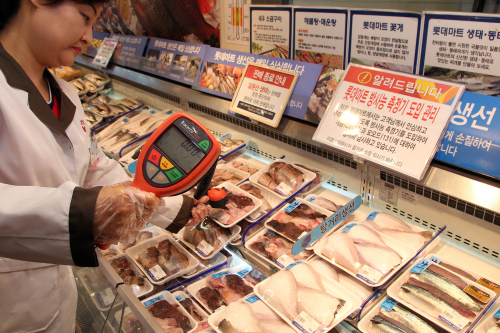Steelmakers, oil refiners benefit from damaged production in Japan
The March 11 earthquake and tsunami in Japan is seen as having a limited, short-term impact on the Korean economy despite having disrupted parts supplies for automobile and electronics makers, experts said Sunday.
In fact, some sectors including steel and oil refining are benefiting from the damaged production in the neighboring country, they said.
The country’s exports to Japan jumped by more than 51 percent during the March 12-29 period despite concerns that trade may be disrupted by the unexpected disaster, state-run Korea Trade-Investment Agency said.
Imports of parts and supplies from Japan remained relatively stable, having grown 12.4 percent on-year, despite worries over disruption from suspended factory operations in Japan, KOTRA said.
“Some manufacturing companies in Korea are heavily dependent on Japan as a major supplier of intermediate goods, which could lead to difficulties in production,” a Korea Development Institute report said.
“However, the share of exports to Japan accounts for only 6 percent of Korea’s total exports … meaning that the impact of Japan’s earthquake on the overall Korean economy is expected to be limited.”
Experts assessed that the disaster in Japan could boost the Korean economy which had been struggling from the global economic slowdown and high commodities prices.
The benchmark KOSPI index reached 2,127.97 as of Friday on foreign investments, which increasingly flowed into the local market.
The country’s improving economic indices and the strong won against the dollar have also pushed up the benchmark index, market watchers said.
The March 11 earthquake and tsunami in Japan is seen as having a limited, short-term impact on the Korean economy despite having disrupted parts supplies for automobile and electronics makers, experts said Sunday.
In fact, some sectors including steel and oil refining are benefiting from the damaged production in the neighboring country, they said.
The country’s exports to Japan jumped by more than 51 percent during the March 12-29 period despite concerns that trade may be disrupted by the unexpected disaster, state-run Korea Trade-Investment Agency said.
Imports of parts and supplies from Japan remained relatively stable, having grown 12.4 percent on-year, despite worries over disruption from suspended factory operations in Japan, KOTRA said.
“Some manufacturing companies in Korea are heavily dependent on Japan as a major supplier of intermediate goods, which could lead to difficulties in production,” a Korea Development Institute report said.
“However, the share of exports to Japan accounts for only 6 percent of Korea’s total exports … meaning that the impact of Japan’s earthquake on the overall Korean economy is expected to be limited.”
Experts assessed that the disaster in Japan could boost the Korean economy which had been struggling from the global economic slowdown and high commodities prices.
The benchmark KOSPI index reached 2,127.97 as of Friday on foreign investments, which increasingly flowed into the local market.
The country’s improving economic indices and the strong won against the dollar have also pushed up the benchmark index, market watchers said.

The index, which topped the 2,000 mark at the beginning of the year, tumbled into the 1,900s in February on concerns over Middle East unrest and surging international oil and raw material prices.
Steelmakers and oil refiners especially have gained from the natural disaster on elevated relative competitiveness compared to those of Japan, market watchers said.
“Korean firms in industries which are in fierce competition with those of Japan have drawn in more investors (since the quake),” Gwak Jung-bo, an analyst at Samsung Securities Co. said.
POSCO’s share price jumped 10 percent in 10 days of trading after the earthquake; Hyundai Steel, Korea’s No. 2 producer after POSCO, was up 11 percent.
Exports of oil products grew three-fold over the period, while those of stainless steel plates and auto parts jumped 84.1 percent and 48.1 percent, respectively.
“The trend is expected to even accelerate due to demands for production normalization and recovery works in Japan,” KOTRA officials said.
The Japanese government’s large-scale expenditure for reconstruction will help contracted economic activities rebound and the nation’s excess production capacity could also help offset production losses, the KDI report said.
Meanwhile, exports of foods including bottled water, instant noodles and kelp, which are believed to help combat radiation exposure, have also soared during the period, KOTRA said.
By Koh Young-aah (youngaah@heraldcorp.com)








![[Kim Seong-kon] Democracy and the future of South Korea](http://res.heraldm.com/phpwas/restmb_idxmake.php?idx=644&simg=/content/image/2024/04/16/20240416050802_0.jpg&u=)







![[KH Explains] Hyundai's full hybrid edge to pay off amid slow transition to pure EVs](http://res.heraldm.com/phpwas/restmb_idxmake.php?idx=652&simg=/content/image/2024/04/18/20240418050645_0.jpg&u=20240418181020)

![[Today’s K-pop] Zico drops snippet of collaboration with Jennie](http://res.heraldm.com/phpwas/restmb_idxmake.php?idx=642&simg=/content/image/2024/04/18/20240418050702_0.jpg&u=)